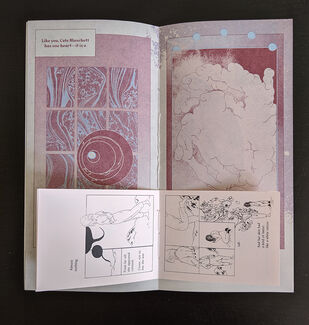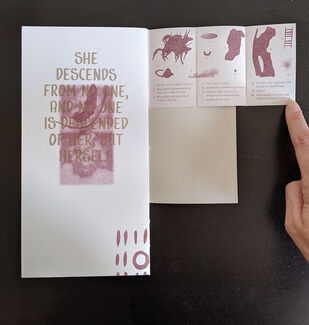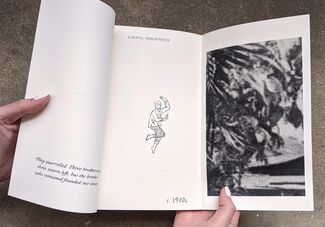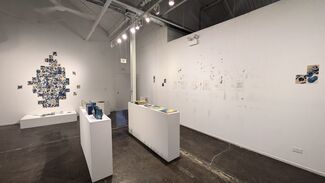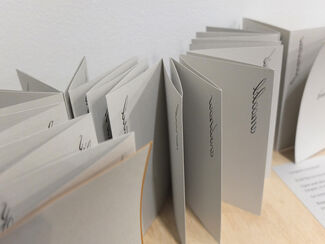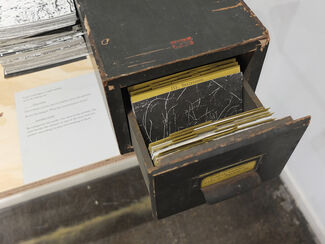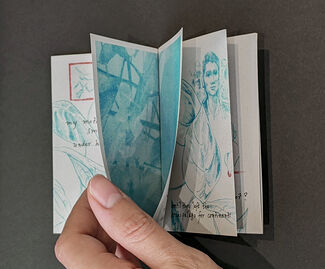| Beyond the Margins: Self-Publishing in Practice |
Visual Communication Design |
3300 (001) |
Fall 2025 |
|
Description
This studio course surveys cross-disciplinary approaches to publishing, encouraging students to explore the role of publications in their creative practices. Self-publishing and independent publishing models will be studied as ways to express ideas, share stories, and form community. The course will cover periodical, serial, and standalone formats, such as journals, chapbooks, and zines; varied design and production methods, including DIY, bookbinding, and printing techniques; and distribution platforms and strategies, including book/zine fairs. Readings will include publishing manifestos and projects by artists, designers, writers, and small presses, as well as visits to the Joan Flasch Artists' Book Collection. Students will produce 2-3 self-directed, editioned projects that could serve as foundations for or further developments of their publishing practices. Pre-req: Viscom 3011 Intermediate Type or Viscom 3001 Intermediate Graphic Design, or instructor consent.
|
Class Number
1878
Credits
3
|
| Expanding Comics: Interdisciplinary Approaches |
Visual Communication Design |
5011 (001) |
Spring 2026 |
|
Description
This critique seminar frames the definition and structure of comics through a wide interdisciplinary lens. As a means of visual communication, comics adapts and configures elements of a variety of disciplines to produce a multimodal reading experience. Students will examine how comics are constructed and develop discourse on what constitutes comics through conceptual investigation and comparative studies. By experimenting with comics beyond the page, students will deepen and expand their understanding of comics and its vast possibilities.
We will explore art and design works in relation to comics as points of departure for students¿ research. This may include Lilli Carre¿s animations and artist¿s books; Seth¿s Dominion; the Chicago Imagists¿ paintings and sculptures; Lorna Simpson¿s series of photographs with text; Dadaist posters; 20th-century Japanese woodblock prints; experimental films, such as La Jete; pictographic writing systems, such as Mayan script; comics exhibition design at the MCA; and works in the Joan Flasch Artist¿s Book Collection.
Students can expect to synthesize their research into interdisciplinary approaches to comics generating 3-4 outcomes. The coursework builds skills and methodologies to prepare students for dynamic professional practices.
|
Class Number
2500
Credits
3
|
| Post-Baccalaureate Visual Communication Seminar: Theory and Practice |
Visual Communication Design |
5020 (001) |
Fall 2025 |
|
Description
This seminar will introduce students to contemporary visual communication theories and realities by presenting diverse models of design practice and counter-practice. A series of visiting designers and artists will represent their own working relationships within the realms of commerce/culture/community, to expose students to the evolving range of theoretical, aesthetic, and professional options open to them. Students will engage with contextual readings and conduct self-directed research, in order to inform the development of a series of brief conceptual design exercises and/or analytical writings.
|
Class Number
2133
Credits
3
|
| Viscom Seminar: Form--Configuration--Context |
Visual Communication Design |
5310 (001) |
Fall 2025 |
|
Description
This critique seminar explores conceptual and structural configurations of personal and public cultural space. Constructing discourses about social, cultural and political phenomena, students derive content and voice to produce process artifacts that may range from a communications tool (a singular, interactive element) to a communications scenario (a system of urban or media elements). Two projects are given, each using a distinct methodology. Beginning with a focus on personal cultural space, students investigate the influence of mediated messages on the construction of identity using a generative matrix, pairing symbol systems with functions of communication. The semester continues with a focus on public cultural space, as students examine the dynamics of a chosen community using the process of dialogical mapping, developing diagrams that clarify rhetorical and metaphoric relationships within a community. Each methodology introduced in this seminar is inferred from linguistic analysis, intended to reveal and cultivate the complexities within each student's work.
|
Class Number
2079
Credits
3
|
| Viscom Seminar: Form--Configuration--Context |
Visual Communication Design |
5310 (002) |
Fall 2025 |
|
Description
This critique seminar explores conceptual and structural configurations of personal and public cultural space. Constructing discourses about social, cultural and political phenomena, students derive content and voice to produce process artifacts that may range from a communications tool (a singular, interactive element) to a communications scenario (a system of urban or media elements). Two projects are given, each using a distinct methodology. Beginning with a focus on personal cultural space, students investigate the influence of mediated messages on the construction of identity using a generative matrix, pairing symbol systems with functions of communication. The semester continues with a focus on public cultural space, as students examine the dynamics of a chosen community using the process of dialogical mapping, developing diagrams that clarify rhetorical and metaphoric relationships within a community. Each methodology introduced in this seminar is inferred from linguistic analysis, intended to reveal and cultivate the complexities within each student's work.
|
Class Number
2086
Credits
3
|
| Grad Projects: Comics |
Visual Communication Design |
6009 (004) |
Spring 2026 |
|
Description
Taken every semester, the Graduate Projects courses allow students to focus in private sessions on the development of their work. Students register for 6 hours of Graduate Project credit in each semester of study.
|
Class Number
2351
Credits
3 - 6
|


